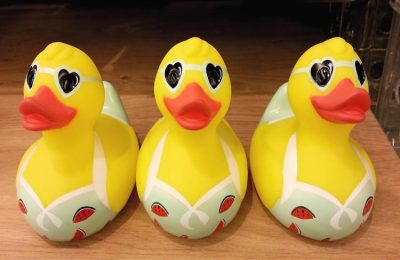All and every are determiners.
We use them both to indicate the complete amount or number of something.
The meaning is practically the same but the form is different:
“all” + “of” (optional) + “the” + plural form of noun
All of the ducks are yellow.
All the ducks are yellow.

Since we use the plural form of the noun (ducks), we must also use the plural form of the verb. In this example, we use the 3rd person plural of the verb “be” (“are”)
“every” + singular form of noun
Every duck is yellow.
Since we use the singular form of the noun (duck), we must also use the singular form of the verb. In this example, we use the 3rd person singular of the verb “be” (“is”)
More examples:
All of the cakes are chocolate cakes.
Every cake is a chocolate cake.
All of the children are happy.
Every child is happy.
Possessive adjectives
my, your, his, her, its, our, their
We may use “all” with possessive adjectives:
All of your cars are red.
All of her dresses are blue.
But we do NOT use possessive adjectives with “every“:
Every your car is red. ![]()
Every her dress is blue. ![]()
Demonstratives
Singular demonstratives: this, that
Plural demonstratives: these, those
We may use “all” with plural demonstratives:
All of these eggs are fresh.
All of those oranges are from Spain.
But we do NOT use demonstratives (singular or plural) with “every“:
Every these egg is fresh. ![]()
Every this egg is fresh. ![]()
Every those orange is from Spain. ![]()
Every that orange is from Spain. ![]()
Uncountable nouns
Uncountable nouns are substances, concepts, liquids that we cannot divide into separate elements. We cannot count them. Examples: milk, music, furniture, information.
We may use “all” with uncountable nouns:
The form is:
all + uncountable noun (singular)
Examples:
I drank all the water.
He gave me all the information.
We do NOT use “every” with uncountable nouns:
I drank every water. ![]()
He gave me every information. ![]()


alpa says
Every person has his own battle in life
All of us are very lazi and did not have checked at deadline of paying bills.
Everyone has own choice to select options
Every dog has its day.
Thank you Andrew . its really helpful